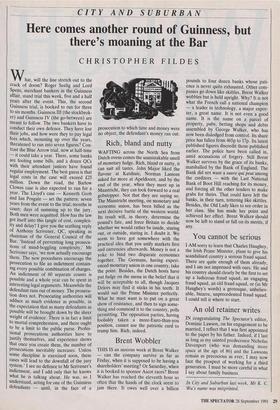CITY AND SUBURBAN
Here comes another round of Guinness, but there's moaning at the Bar
CHRISTOPHER FILDES
What, will the line stretch out to the crack of doom? Roger Seelig and Lord Spens, merchant bankers in the Guinness affair, stand trial this week, five and a half years after the event. This, the second Guinness trial, is booked to run for three to six months. Guinness III (the stockbrok- er) and Guinness IV (the go-between) are meant to follow. The two bankers have to conduct their own defence. They have lost their jobs, and how were they to pay legal fees which, mounting up over the years, threatened to run into seven figures? Con- trast the Blue Arrow trial, now at half-time — it could take a year. There, some banks are footing some bills, and a dozen QCs with their attendant juniors have found regular employment. The best guess is that legal costs in the case will exceed £25 million. Down the road, the Barlow Clowes case is also expected to run for a year. The Lloyd's case — Kenneth Grob and Ian Posgate — set the pattern: seven years from the event to the trial; months in court; days of summing up to the jury. Both men were acquitted. How has the law got itself into this tangle of cost, complex- ity and delay? I give you the scathing reply of Anthony Scrivener, QC, speaking as chairman of the General Council of the Bar. 'Instead of preventing long prosecu- tions of mind-boggling complexity,' Mr Scrivener says, 'we now actually encourage them. The new procedures encourage the prosecution to file an indictment contain- ing every possible combination of charges. An indictment of 60 separate counts is possible and a whole year can be spent in interesting legal arguments. Meanwhile the defendant runs out of money. The prosecu- tion does not. Prosecuting authorities will adduce as much evidence as possible, in the expectation that as many defendants as possible will be brought down by the sheer weight of evidence. There is in fact a limit to mortal comprehension, and there ought to be a limit to the public purse. Profes- sional prosecutions authorities have to justify themselves, and experience shows that once you create them, the number of prosecutions inevitably increases. Unless some discipline is exercised soon, these cases will lead to the downfall of the jury system.' I see no defence to Mr Scrivener's indictment, and I add only that he knows what he is talking about. He was, so I understand, acting for one of the Guinness defendants — until, in the face of a prosecution to which time and money were no object, the defendant's money ran out.


































































 Previous page
Previous page